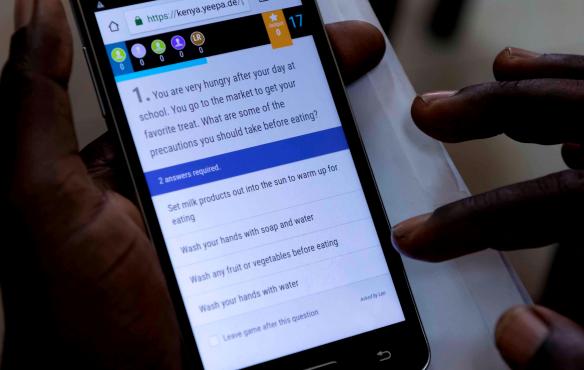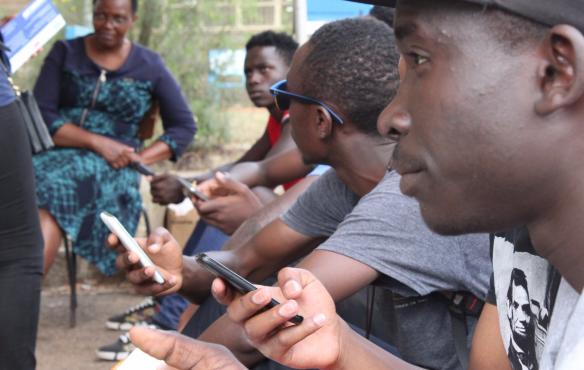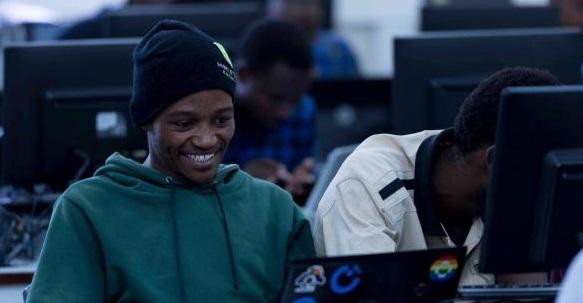The lab of tomorrow addresses lack of chronic disease prevention in Kenya
The lab of tomorrow is a project within the Deutsche Gesellschaft für Internationale Zusammenarbeit (GIZ) on behalf of the German Federal Ministry for Economic Cooperation and Development (BMZ). It offers innovative approaches for solution-oriented private sector cooperation projects in line with the 2030 Agenda. The lab of tomorrow is guided by design thinking and business design methodology. It creates business-driven solutions for concrete challenges in developing and emerging countries. At the core for each of these projects, it matches local and European companies, academia and the public sector to co-create and bring to market products and services that have a positive social and ecological impact and solve the initially defined challenge.
The Health Games were developed as an answer to the challenge of improving chronic disease prevention and control. Which kind of chronic diseases are being addressed, and why are these critical in Kenya?
Health Games emerged from one of our lab of tomorrow programmes. The lab of tomorrow (lot) is a business development programme to solve specific challenges in developing countries and emerging economies, in this case non-communicable diseases in Kenya. The programme inspires businesses from Europe and partner countries to jointly create new products and services that meet local needs. Guided by Design-Thinking principles and supported by topic experts and the public sector, the lab of tomorrow enables businesses to develop ventures which help to achieve relevant Sustainable Development Goals (SDGs).
More than 40 per cent of all hospital deaths in Kenya are due to non-communicable diseases (NCDs), such as heart disease, cancer, diabetes and chronic respiratory diseases. Due to the need for an approach to communicate these dramatically increasing health problems to health professionals and the public, the fifth lab of tomorrow programme focused on the prevention and control of NCDs in Kenya. Here, as in all our programmes, as a first step our experts carefully analysed the local market and researched the unmet needs to develop business opportunities with social impact. The next step is to tackle the identified business opportunities by interdisciplinary teams with the aim to build sustainable businesses that will then operate on their own.
Health Games emerged as one of the ventures that successfully concluded the lab of tomorrow programme in 2017. Starting from NCDs, today Health Games provides a platform for partners, such as social marketing agencies, NGOs, Ministries of Education or companies who organize the competitions and integrate them into educational programs of universities, schools and companies. In total, 20,000 people have taken part in different knowledge competitions on various topics. Health Games also advises its partners on how best to gamify content as a coherent story, which is one of their revenue sources. In addition, Health games charges customers depending on the number of participants active on the platform provided by Health Games.
During the pandemic for example, Health Games helped organise the the first Pan-African mobile knowledge tournament "Contest against Corona" as a multiplayer game in English, French and Arabic on the Health Games platform with more than 5,000 participants. The game provided crucial information to identify and address current fake news with regards to the pandemic in different African countries.

Can you explain why Health Games are effective in raising awareness about non-communicable diseases? What is the incentive for gamers?
We see Health Games as an effective educational tool because the learning process is fun, and the data-driven approach allows us to provide targeted learning content for each player. The game-based approach encourages open dialogue about sensitive topics such as sexual diseases while providing credible information. Competition between players and weekly prizes are another incentive for young people to play and learn more about health and the importance of prevention.
In addition, Health Games is particularly effective because its offering is scalable and its game can be integrated into existing processes. A good example is a family planning NGO that can use the tool in the classroom to increase their reach. In this way, student engagement is increased and so is learning. With the data Health Games collects from the games, they can give students accurate feedback on where they are with their knowledge, where they need to improve, and where they need to learn more. Overall, Health Games allows for continuous testing without making it uncomfortable for players; hence, it’s an effective learning tool – and a great answer to an identified challenge.
How do you use the data you compile through the e-learning platforms? Does this enable specific segments of the population to be targeted for health outreach?
The lab of tomorrow only accompanies the ventures until they have successfully reached the market and the companies that are established are owned and scaled by the private sector directly.
The gathered data exclusively belongs to the customers who use the Health Games platform. Neither Health Games nor the lab of tomorrow have access to the data. According to our information, Health Games is privacy compliant, data is anonymised and not traceable to individuals.

You are planning to scale and build tools that will be used by multi-national companies such as JSI, Merck and BASF. How did these partnerships arise and how will they use the tools you create?
The partnerships were also a result of participation in our lab of tomorrow programme. Finding like-minded people who want to create innovative change is one of the incentives for being part of the programme for many of the participants. In this case, they had the same mindset as Health Games, particularly around transparency of learning. Merck’s focus was on NCDs, while BASF mainly focused on agriculture. Health Games developed a game for BASF for agricultural extension agents, farmers and students to help identify and combat the "fall army worm," a worm that affects crops.
What do you see as the future of Health Games? Will they be adapted for use in other regions? What are the next steps for lab of tomorrow?
Health Games are actually open to all markets – their visibility is growing and the digital tool is scaling well. The venture’s vision is an Olympics of knowledge games and they absolutely have capacity to implement this.
Currently, Health Games are establishing a regular mobile, multilingual "Pan African Health Knowledge Contest" as an international analytical tool for the African Digital Health Education Observatory. It is important to continue to increase the importance of health education, precisely because topics such as "pandemic preparedness" encompass not only the preventive measures of doctors, hospitals and governments, but also the education of the population.
The lab of tomorrow currently has several programmes running related to digital tourism in Namibia, waste management in the Western Balkans and last-mile deliveries in Nigeria. Overall, we are steadily expanding our network of partners and investors and addressing unmet needs with business potential not only in the health sector, but in various sectors and countries.
